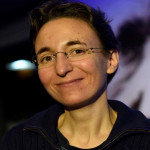Class 2018
PhD Grant: PD/BD/142946/2018
PhD thesis
Deciphering the cellular crosstalk in the bone marrow microenvironment of acquired aplastic anemia towards the expansion of transplantable hematopoietic stem/progenitor cells
Supervisors
• Cláudia Lobato da Silva, Professor @ IST/ULisboa, PT
• Domingos Henrique, Principal Investigator @ iMM – Instituto de Medicina Molecular João Lobo Antunes, Lista, PT
Collaborators
• Doctor Joana Santos, Centro Hospitalar de Setúbal, EPE
• Doctor Luciana Leite, Centro Clínico da Guarda Nacional Republicana
• Professor Majlinda Lako, Institute of Genetic Medicine, Newcastle University
• Doctor João Sarmento Esteves, Hospital CUF Sintra, Portugal
PhD Degree complete: Discussion on June, 2025
THESIS ABSTRACT
The aim of this project is to better understand the physiopathology of idiopathic aplastic anemia (AA) in what regards the cellular crosstalk in the bone marrow (BM) microenvironment, particularly focusing on hematopoietic stem/progenitor cells (HSPC) and mesenchymal stromal cells (MSC) towards the expansion of transplantable HSPC for autologous hematopoietic transplantation.
Adult HSPC and MSC from AA patients and healthy donors are isolated, cultured and thorough characterized. Since AA is a rare disease, in order to overcome the scarcity of cell samples, human induced pluripotent stem cell (hiPSCs) derived from AA patients (AA-hiPSCs) (gently provided by Professor Majlinda Lako from Institute of Genetic Medicine, Newcastle University, UK) are being used to be differentiated into HSPC and MSC. A co-culture model of HSPC-MSC, based on a BM biomimetic scaffold, will be established to study the cellular crosstalk between these cells. Culture conditions will be modulated by using specific molecules e.g., PPAR pathway modulators; arsenic trioxide) in order to assess the adipogenic differentiation bias observed in different studies for AA cells over healthy donor cells and its impact on the hematopoietic supportive capacity of these cells. Finally, HSPC will then be expanded ex vivo under previously optimized culture conditions and their engraftment potential and multilineage hematopoietic reconstitution capacity will be tested in vivo using an animal model (NSG mice) available at iMM.
PUBLICATIONS
Papers
Carvalho, M.S., Alves, L., Bogalho, I., Cabral, J.M.S., da Silva, C.L.. “Impact of Donor Age on the Osteogenic Supportive Capacity of Mesenchymal Stromal Cell-Derived Extracellular Matrix”, Front. Cell. Dev. Biol., 9:747521 (2021). https://doi.org/10.3389/fcell.2021.747521
Grenho, F., L.ourenço, A., Ventura, S., Bogalho, I., Bargiela, I., Silva, C.S., Martins, F., Hatchbach, L., Lopes, N., Prades, A., Gomes, M.J., “Clinical Features of Patients with COVID-19 Admitted to the Dedicated Service of CUF Infante Santo Hospital: A Series of Clinical Cases: Características Clínicas de Doentes com COVID-19 num Internamento Dedicado do Hospital CUF Infante Santo: Série de Casos”, Gaz. Med., 7(2) 82-91 (2020) https://doi.org/10.29315/gm.v7i2.367
DOCTORAL PROGRAM (36 ECTS)
Curricular Units:
• General Doctoral Training (6 ECTS)
• Bioentrepreneurship (6 ECTS)
• Biotecnologia Molecular (6 ECTS)
• Engenharia de Células Estaminais (6 ECTS)
• Advanced Experimental Techniques and methodologies (6 ECTS)
• Formação Doutoral Geral (6 ECTS)